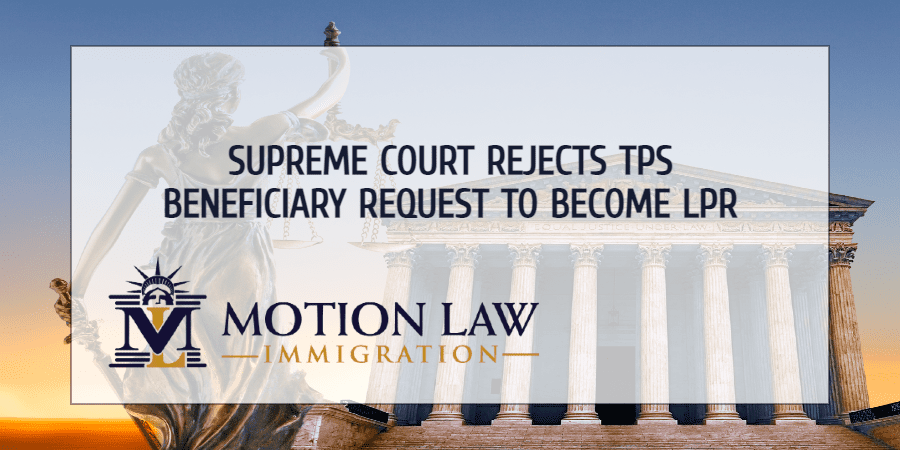Supreme Court Rejects TPS Beneficiary Request to Become LPR

Sanchez’s case became national news
Jose Santos Sanchez and Sonia Gonzales, an immigrant couple from El Salvador who entered the US without legal documentation in 1997 and 1998 respectively, have been involved in an almost endless legal battle until today, when the Supreme Court of Justice ruled against their request.
To know and understand the background of the case, it is important to explain that, after crossing the US’ borders without prior authorization, Sanchez applied for TPS (Temporary Protected Status) in 2001, when the Secretary of DHS (Department of National Security) designated El Salvador for this deportation relief program, which protects nationals of certain countries experiencing unusually risky or dangerous conditions for a specified period of time.
At that time, El Salvador was experiencing extreme weather conditions and was hit by several earthquakes. Thus, DHS granted TPS to eligible citizens of El Salvador residing in the US, regardless of their immigration status.
In 2014, Sanchez followed the process to apply for a Green Card, that is, to become an LPR (Lawful Permanent Resident) of the US. The USCIS (US Citizenship and Immigration Services) rejected Sanchez’s application, stating that he was not legally admitted to the country and, despite being temporarily protected by TPS, he was not eligible to become an LPR.
Since then, Sanchez has challenged and contradicted the USCIS response in different courts, arguing that he has already built his life in the US, has four children, and has lived in the North American territory for more than two decades. Nevertheless, the case reached the Supreme Court of Justice.
Contact Motion Law for your immigration process and schedule a FREE Consultation!
Supreme Court states that TPS beneficiaries are not eligible to apply for Green Cards
On Monday, June 7, 2021, the US Supreme Court of Justice released its verdict regarding Sánchez’s case, which has become not only a particular scenario, but a national question about whether TPS beneficiaries may or may not be considered legal immigrants.
The Supreme Court emphasized that “The TPS program gives foreign nationals nonimmigrant status, but it does not admit them. So the conferral of TPS does not make an unlawful entrant (like Sanchez) eligible (…) for adjustment to LPR status. (…) Sanchez was not lawfully admitted, and his TPS does not alter that fact. He therefore cannot become a permanent resident of this country”.
In other words, the Supreme Court verdict clarifies that being a TPS beneficiary does not remove, forgive or omit the fact that an individual was not legally admitted into the US by an immigration officer, that is, that (s)he entered the country without legal documentation.
What does this verdict mean for other similar cases?
This case made national news because it involves a gigantic debate regarding deportation relief programs like TPS or DACA. Therefore, the Supreme Court verdict might be used or cited for other similar cases in lower courts.
The Supreme Court stated that the only way to change this guidance regarding programs like TPS is if Congress outlines a path to legal documentation for certain immigrants who entered the country unlawfully, which is a possibility under the Biden administration, but it is still uncertain.
How can you learn about other alternatives available for your immigration case?
It is important that you, first of all, avoid illegally migrating to the US and always follow legal guidelines and regular protocols established by the local immigration system. That is truly the best strategy to protect your future.
Apart from that, we recommend that you follow the advice of immigration professionals, who know and understand current policies, and who will be able to guide you towards the success of your application and help you choose the process that best suits your current needs.
If you have any questions about an immigration issue or relating to a case you may have currently in progress, then please don’t hesitate to contact us for a FREE Phone Consultation with one of our expert immigration attorneys.
Simply call Motion Law today at: (202) 918-1799.